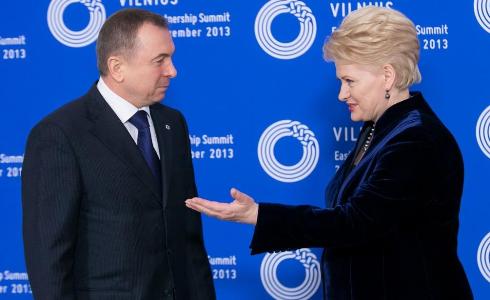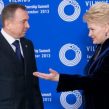
Belarus-West Relations: Ready to Break the ‘Vicious Circle?’
Publication: Eurasia Daily Monitor Volume: 12 Issue: 189
By:

In the last decade or so, Belarus’s relations with the West became popularly characterized as locked in a “vicious circle.” The term was widely used in diplomatic and expert communities to refer to the cyclical nature of the relationship that was, in turn, tied to the internal political cycles in Belarus (Liberalclub.biz, November 28, 2013). According to this cyclical logic, relations would improve as the next Belarusian presidential election approached but would inevitably return to a frozen state, with sanctions and mutually restrictive measures, once the electoral campaign was over.
This time, however, the Belarusian authorities clearly stated that they wanted to break the “vicious circle” and pledged to do their best to make it happen (Mfa.gov.by, May 19). The presidential elections, held on October 11, 2015, and the following public reaction—primarily, by the European Union and, to a lesser extent, the United States—show that the effort has generally been successful (see EDM, October 13). For the first time in years, Minsk appears set to push ahead on further rapprochement with the West after the conclusion of Belarus’s most recent electoral race.
The actual attempts by Minsk to unfreeze the western flank of its foreign policy began at the end of 2012 (Belinstitute.eu, January 23, 2013). Multiple diplomatic contacts that took place in 2013 and 2014 gradually created a basis for substantive discussions on matters of mutual interest with the EU: technical and sectoral cooperation, trade and investments, prospects for visa facilitation and liberalization, and ultimately the so-called consultations on modernization (BelTA, May 28, 2014). With the US, Belarusian diplomats agreed on a “list of small steps” that served as a roadmap for cautious progress in bilateral relations, while keeping the most problematic issues off the agenda (Mfa.gov.by, May 19).
Prospects for fully-fledged normalization remained out of reach as long as several persons, viewed as political prisoners in the West, remained behind bars in Belarus. However, at the end of August 2015, President Alyaksandr Lukashenka decided to pardon them, thus effectively opening the way for further rapprochement (see EDM, September 4). Already then, Minsk made it clear to Washington and EU capitals that it anticipated an unequivocal and quick reaction from them. According to a number of Western ambassadors based in Belarus, they were presented with an elaborate list of measures that the Belarusian authorities expected from their governments (Author’s interviews, September 2015). In the past, EU and US diplomats had been accused of promising too much and for too long in order to resolve the issue of the political prisoners.
But as the prisoners were released only a month and a half before the election, it was particularly problematic for the West to deliver on its promises. Western officials remembered how previous efforts at rapprochement with Belarus, in 2008–2010, ended, and they did not want to again risk their reputations. Thus, they made it clear to Minsk that if this year’s election was held more transparently and without major disturbances, further improvement in Belarus-West relations would follow (Tut.by, September 2).
These circumstances drew primary attention to the international monitors’ assessment of the election. Focus was not so much on the actual election results announced by the Central Election Commission, which gave the incumbent 83.5 percent of the votes, but mostly on whether the election had demonstrated any progress toward more transparency (BelTA, October 16).
Election monitors from the Organization for Security and Cooperation in Europe’s (OSCE) Office for Democratic Institutions and Human Rights (ODIHR), the OSCE Parliamentary Assembly (OSCE PA), as well as the Parliamentary Assembly of the Council of Europe (PACE) released their preliminary conclusions a day after the vote. The following paragraph best summarizes their tentative findings (Osce.org, October 12):
This mixed assessment, particularly the fact that no violence occurred on election night, brought relief to Western the governments that were arguing in favor of further engagement with Belarus. Already on October 12, EU foreign ministers reached a political agreement to suspend Belarusian sanctions (Ont.by, October 12). This will, however, be done in a round-about way: the EU Council will technically prolong the sanctions for a year but then immediately freeze them for four months (Nasha Niva, October 9). This scheme has yet to be made official, most probably before October 31, when the current sanctions regime expires.
Washington has been slower in its reaction. It welcomed the fact that the election had ended peacefully, but also expressed disappointment about its multiple shortcomings (State.gov, October 12). Now, US officials, given their earlier promises to Minsk, will need to carve out a political response. In this, they are somewhat limited by the Belarus Democracy and Sanctions Act, which will remain in place until the Congress decides that the situation in Belarus has changed.
Belarus’s authorities are currently signaling to the West that all sanctions should be lifted permanently (BelaPAN, October 15). At the same time, Foreign Minister Uladzimir Makei indicated that Minsk understands the difficulties, at least on the EU side, of making such political decisions quickly, which seems like a good sign for relations in the near term (YouTube, October 18). And the Belarusian government is, as never before, interested in sustaining the positive process beyond what has been achieved within the elections framework (BelTA, October 11).
Meanwhile, Russian observers have started discussing whether the Kremlin can learn from Belarus’s latest experience of mending ties with the West (Carnegie.ru, October 15). This, perhaps, can be seen as evidence of the success of Belarusian diplomacy in finally breaking the “vicious circle.” Nevertheless, it is yet too early to make any definitive conclusions. A long and difficult road lies ahead, while a great many actors both inside and outside Belarus have an interest in blocking any way forward and forcing a reversal.




